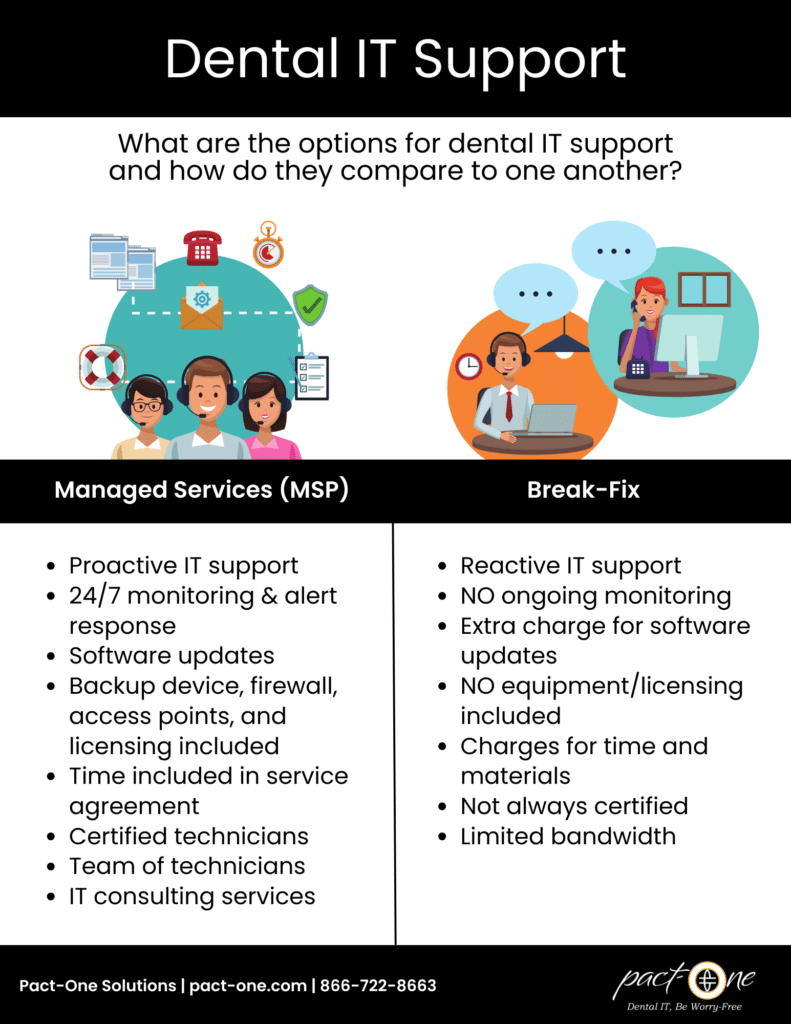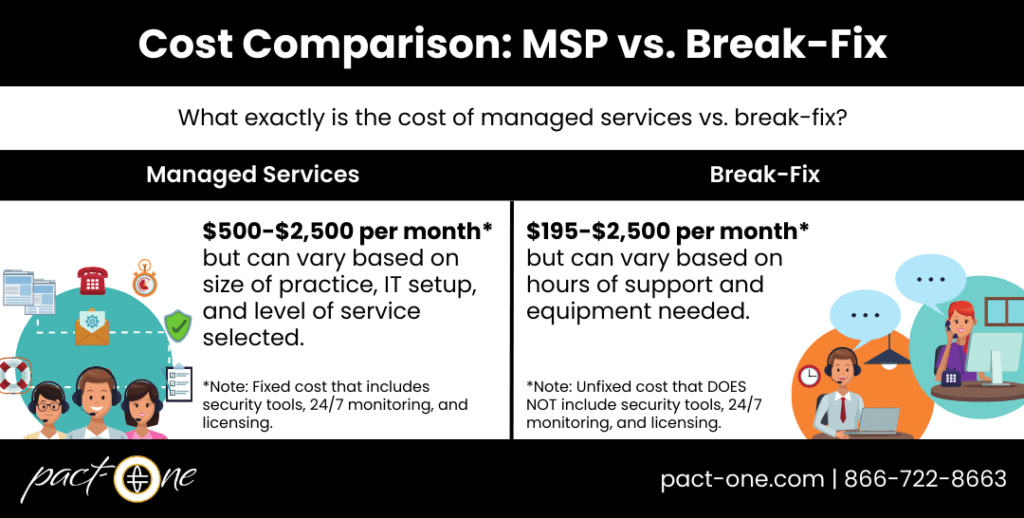With the continual rise of ransomware attacks (every 2 seconds by 2031 - reported by Cybercrime Magazine) and natural disasters (28 separate disasters costing at least $1 billion each in 2023 – reported by Climate.gov), reliable and secure IT support is no longer a luxury but a necessity.
However, navigating the waters of dental IT support can be rocky, especially for those who are not tech-savvy. This article aims to dissect the landscape of dental IT support, considering the benefits, drawbacks, and available options, all while shining a light on the accompanying costs.
Dental IT Support Pros and Cons
Understanding the various sides of dental IT support is crucial for making informed decisions for your practice. Here, we discuss the major pros and cons to give you a clear picture of what to expect.
Pros of Dental IT Support
Here are three compelling advantages of investing in professional dental IT support:
-
Enhanced Security Measures
Your patients' data is sacred, therefore ensuring the highest level of security is a huge responsibility. Dental IT support services can provide robust security measures, such as encrypted networks, regular system updates, and proactive monitoring (minions working 24/7 in the background) for potential threats, safeguarding sensitive patient information.
-
Improved Workflow Efficiency
Efficiency in a dental practice is often the difference between a well-oiled machine and a daily struggle to keep up with patient appointments. IT support can streamline your workflows through integrated software solutions, reducing administrative tasks, and increasing efficiency and productivity. Your staff won’t have to wait on the phone and troubleshoot with Dentrix or Eaglesoft support (freeing up their hands for more important tasks), an IT support technician can handle it for them.
-
Expertise and Advice
IT support services offer an expert's perspective, often acting as a dental IT consultant for all your technology-related questions or needs. Their industry knowledge can guide you toward selecting the most suitable software, hardware, and cloud solutions for your practice's unique requirements.
Cons of Dental IT Support
While the pros are significant, there are also some potential drawbacks to consider:
-
Initial Setup Challenges
To get your network up-to-par, initial setup challenges may occur. Setting up new IT systems or overhauling existing ones can be a daunting task that may require a substantial investment (time and cost).
-
Dependence and Accountability
Outsourcing your dental IT support means placing a significant amount of reliance on an external entity. With this comes accountability, and in case of system failures, the IT provider must be capable and responsive of addressing issues swiftly.
-
Ongoing Management
IT systems require ongoing management to keep them functioning at their best. This may involve regular maintenance, the implementation of updates, and occasional troubleshooting, which can be time-consuming without proper management processes in place.
Are there Options for Dental IT Support?
Yes, there are varied approaches to consider for dental IT support. Two practice models are working with managed service providers (MSPs) or opting for a more traditional break-fix strategy.
Dental IT Managed Service Provider
An MSP is a third-party company that manages the entirety or parts of a dental practice's IT infrastructure. They handle tasks such as 24/7 monitoring, managing software updates (practice management, imaging, and operating system), providing helpdesk support, and sometimes even offering local on-site visits.
The key benefits of working with an MSP include predictable monthly costs, access to a team of certified IT professionals, and a proactive approach that mitigates the risk of IT issues. However, this model may be pricier for smaller practices with minimal IT needs but can bring considerable value for larger organizations (multi-location dental practices, group dental practices, and dental service organizations) with complex IT setups.
Break-Fix (Time and Material) Dental IT Support
In contrast, a break-fix service agreement charges you only when there's an issue to fix. The payment is usually based on the time and materials used to resolve the problem. This approach is more suitable for practices with relatively stable IT environments and low frequency of required support.
Break-fix is less expensive upfront and can offer flexibility, but it lacks the proactive element that MSPs provide, potentially leading to more significant disruptions and higher costs overall if issues pile up. Additionally, with this type of model, technicians often don’t have the dental industry expertise or the certifications required by those that work for a dental IT company or MSP.
Want a more in-depth overview of these options? Check out our article Break Fix vs. Managed Service: Which is Best for Your Dental Practice.
Cost of Dental IT Support
Understanding the costs associated with dental IT support is central to managing your practice's finances.
The price of IT support can vary drastically depending on the size of your practice, the complexity of your IT setup, the level of service, and the provider's fee structure. Managed services often come with a fixed monthly fee (which includes security tools, ongoing monitoring and management, and licensing), which may increase as your practice grows or its IT needs expand.
Break-fix services, on the other hand, can be erratic in terms of cost (which doesn’t include security tools, ongoing monitoring and management, and licensing – an added expense outside of what you would have to pay for break fix services), making budgeting a bit more challenging. With both models, it's important to factor in extra expenses, such as hardware and software purchases, that may arise during support.
Conclusion
Secure and effective IT support is essential for the modern dental practice. By understanding the pros and cons, exploring support options, and clarifying the associated costs, you’re better equipped to make decisions that will positively affect your practice's efficiency, security, and overall performance.
Whether you opt for a managed service provider or choose another support model, prioritizing your IT health ensures that your practice can continue to serve patients with the highest standards of care (security included). Can your practice afford not to invest in reliable dental IT support? The answer lies at the intersection of your needs and what the market has to offer.
Dental IT. Remove the Burden. Embrace the Use.
Quality patient care – it's ultimately why you became a dental professional. But, some business operations can get in the way (such as pesky computer issues or lack of IT support). That’s where Pact-One Solutions can help! Our passion lies in supplying reliable, responsive dental IT support and security that practices can count on.
Whether you’re looking for dental IT services for your startup or searching for more responsive dental IT support – our team of dental IT specialists have you covered. With team members throughout the United States, we offer nationwide support to dental practices of all sizes. Our wide range of dental IT services ensure your data is secure, accessible, and protected.
Don't let technology challenges hinder your ability to deliver exceptional dental care. Contact us at info@pact-one.com or 866-722-8663 to join 350+ dental practices thriving with the support of a dedicated dental IT team.





You must be logged in to post a comment.